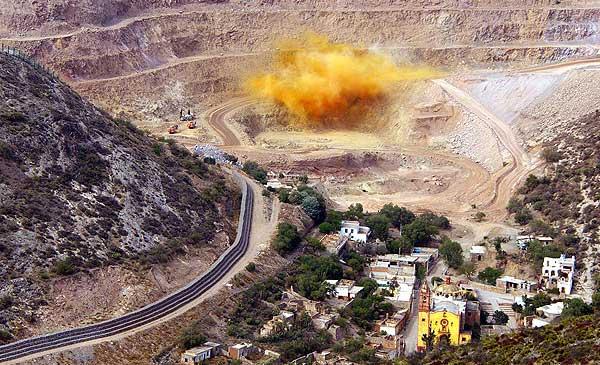
Citizens and environmentalists fear irreversible damage if the Canadian company, Argonaut Gold, carries out its plans to begin operations in the Cerro del Gallo mining project which would exploit 20 thousand 270 hectares of land in the southern region of the Dolores Hidalgo municipality. The Coalición en Defensa de la Cuenca de la Independencia (COCECIN), and Colectivo Guardianes de la Cuenca have called for a march to say, “No to Toxic Mining,” on Sunday, July 21, 9:30am, from Parque Alameda to the Jardín Municipal in Dolores Hidalgo.
To join a caravan to the march from San Miguel, meet at the Fabrica Aurora at 8:30 am. Wear white.
The march will mark the annual Global Day of Action Against Open-Pit Mining declared by international ngos in 2009 to raise awareness of the devastating social and environmental impacts posed by open pit mining and to gain international support for resistance movements such as the prolonged struggle that was taking place against the San Xavier mine which completely destroyed the Cerro San Pedro in San Luis Potosi (pictured above).
On July 8, the environmental organization Acción Colectiva, la Hermandad de la Cuenca de Independencia and la Red Mexicana de Afectados por la Minería called a press conference to warn that the processes to be used--open pit and heap leaching--would further contaminate the Independence watershed that supplies the municipalities of Dolores Hidalgo, San Miguel de Allende, San Luis de la Paz, San José Iturbide, San Felipe, San Diego de la Unión and Doctor Mora where there are already wells from 400 to 700 meters deep with excess levels of arsenic and fluoride. They call on the city council to declare Dolores Hidalgo a mining-free municipality.
The production of just one gold ring requires the removal of 8 tons of soil, contamination with sodium cyanide and the use of over 1,000 gallons of water.
According to the Agenda Ambiental 2018, developed by a special seminar at the UNAM, “The contributions of mining to local development are non-existent… For every thousand dollars acquired by the mining corporations, the affected communities received, through their state and municipal governments, 15 cents.” They point out that “More than 120 environmental conflicts related to mining are currently active in the country reflecting the huge socio-environmental costs and a situation in which the State has effectively renounced regulation of this activity, as well as the protection of the environment and indigenous and rural communities in the regions where this activity is carried out.”
Latin America is slowly winning the fight against the transnational mining companies. In a victory of “water over gold,” El Salvador made history in March, 2017, when it became the first country in the world to ban metal mining outright.
